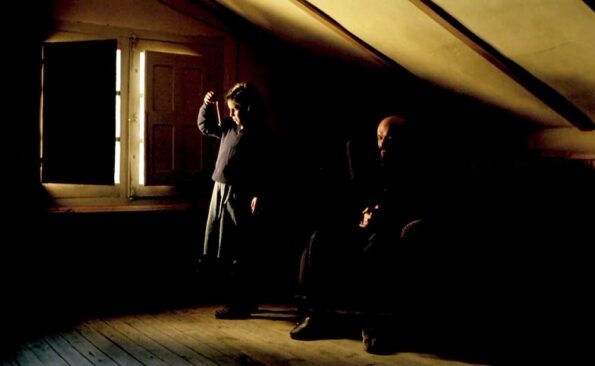Search
To search for an exact match, type the word or phrase you want in quotation marks.
A*DESK has been offering since 2002 contents about criticism and contemporary art. A*DESK has become consolidated thanks to all those who have believed in the project, all those who have followed us, debating, participating and collaborating. Many people have collaborated with A*DESK, and continue to do so. Their efforts, knowledge and belief in the project are what make it grow internationally. At A*DESK we have also generated work for over one hundred professionals in culture, from small collaborations with reviews and classes, to more prolonged and intense collaborations.
At A*DESK we believe in the need for free and universal access to culture and knowledge. We want to carry on being independent, remaining open to more ideas and opinions. If you believe in A*DESK, we need your backing to be able to continue. You can now participate in the project by supporting it. You can choose how much you want to contribute to the project.
You can decide how much you want to bring to the project.

When loneliness weaves clouds into childhood memories, the echo of what might have been and what always will be fades away. El Sur (The South) was born in a room overlooking oblivion, the fog that covers a nation, and a life not lived. An identity constructed from silence, emptiness as a narrative space, and the emotional legacy of a dreamer all inhabit the fabric of a story sung, in chorus, by two intertwined voices: Adelaida García Morales and Víctor Erice.
Those who have experienced the pendulum of letters know that its arc knows no form and always leads to what one searches for, regardless of its appearance. Literature and cinema, thus, share the same destiny: language. Despite the unequal nature of their works, the word is clothed in axiom. Their differences are as evident as they are infinite, but their genesis, the voice and the desire to communicate, is the same. A good example of this is El Sur.
In the summer of 1981, Adelaida García Morales wrote a haunting story in Capileira, Spain. In the twilight of her childhood, Estrella is going through an ordeal of abandonment. In the shadows of silence, memory meets death, sowing doubts and dreams in the fields of absence. The worst suffering, as her father Agustín argued, is that which has no specific cause as it comes from everywhere and from nowhere in particular, faceless. In this intimate dialogue between desire and apprehension, hope trembles within every line, although on the balcony of guilt there is no room for further reproach. “If I have ever known any real happiness, it has been in the most perfect silence and solitude,” Estrella declares. Sadness and bitterness are presented to the reader as the foundations of a story rocked by the gloom of confinement.
This short novel about a girl’s confessions to her deceased father inspired Víctor Erice’s cinematic adaptation. The director enriched the original text in 1983, and the film embellishes the intrafamilial ties and the ineffable suffering of all of them. The omission of Agustín’s son with another woman, his assaults on his own daughter, and his refusal to let Estrella out into the world are proof of this. “That night, I felt that time was destruction,” she disconsolately acknowledges in one passage. However, issues such as gender, the construction of the self, suicide, and the incomplete narratives that define our biographies are at the heart of both fables, and also in virtually all conversations.
Fear, rage, and the yearning for redemption find resonance in El Sur. “Only your presence helped me reconcile myself with that monster that I could already see appearing inside me in my mother’s eyes.” However, her desire to understand what motivated her isolation and the rejection of those around her was her reason for living: “For the first time, I think I began to understand something of your suffering. This hardly mattered, however, because understanding wasn’t enough to reconcile myself with your existence, nor with my mother’s, nor with mine.” If anything swirls round in the canvas of her memory, it is the empathy, as fresh as it was unconditional, that enveloped her every night during those years: “In this ghostly setting of our life together, your silence survived, as well as, unfortunately, the final separation between you and me that, with your death, has become irreversible and eternal.”
In these portraits of the unspoken, literature and cinema intertwine with identity in a wasteland where silence lives. El Sur rolls out an emotional fabric sealed by mistrust, the wounds of war, and a loneliness that awaits its salvation in what is left unspoken. These narrative gaps, far removed from any alienation, resonate strongly in the musings that permeate our time. The interrupted narratives of memory, the fragmented constructions of the self, the secrets of the past, and the need to understand oneself through what is nameless all bear witness to this. Which is why, almost half a century later, its reading and viewing has become indispensable. According to Estrella, it is curious how what is invisible, that which does not really exist, helps us experience the most intense moments of our lives.
[Featured Image: Still from the film El Sur (1983), by Víctor Erice]

Iván Baena González (Madrid, 1995) is a historian, writer, and cultural educator. His work explores identity construction, collective memory, and contemporary thought. He thus combines philosophical and sociological analysis with cultural criticism. He has published a book and contributes to various collective works and magazines such as Qué Leer, Ábaco, Culturamas, and Moon Magazine. He currently teaches Geography and History.
"A desk is a dangerous place from which to watch the world" (John Le Carré)